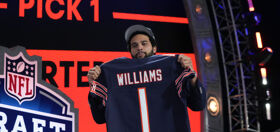
When it comes to legal protections for LGBTQ people, the state of Georgia doesn’t offer much. There is no hate crime law covering sexual orientation or gender identity, and it’s still legal for an employer to fire someone for being gay.
Luke Gardner grew up near the small city of Albany, Georgia (population 73,179), where he says access anything LGBTQ-related was extremely “limited.”
“I didn’t have many local queer role models,” he writes in a moving op-ed published by the Georgia Voice. “I knew of one or two out gay couples, but no one in my immediate circle of friends or family understood my struggles.”
Gardner says hardly anyone at his high school was out and “being gender non-binary, intersex, aromantic and pansexual were unknowns in the small Georgia town.”
How about we take this to the next level?
Our newsletter is like a refreshing cocktail (or mocktail) of LGBTQ+ entertainment and pop culture, served up with a side of eye-candy.

Resources were also in short supply. Things like LGBTQ-friendly therapists or doctors who treated trans patients, which are relatively easy to find in larger metropolitan areas, were practically non-existent in rural Georgia.
“I had friends share stories of leaving therapy worse than they entered due to homophobia and ignorance amongst counselor,” Gardner says.
He continues:
There were no safe spaces for us and no diversity training on LGBTQ issues. I never wanted to see a school counselor because I knew they wouldn’t understand a liberal, witchy, mentally-ill queer kid. In sex education, queer issues were avoided altogether; We were left to figure out their bodies and desires.

There also weren’t any gay bars, clubs, or hangouts to meet queer people. In fact, connecting with other LGBTQ people could be next to impossible.
“Rural Georgia is spotty,” Gardner writes. “There aren’t gay communities, only individuals living in the dark.”
And as for Grindr, Gardner says, “It would take an hour for me to meet the closest guy.”
This lack of rural queer representation is in direct relation to the social stigma faced by queer individuals, especially trans and gender non-binary people. This stigma is significantly more present in rural communities, which often consist of tight-knit, like-minded groups of people. In rural Georgia, those people are usually the conservative evangelicals who make our state red every during the election, and we know where they stand when it comes to progress.

Gardner now lives in Atlanta, which he describes as “a speck of blue in a deep red state” and a “saving grace” for marginalized Georgians like himself.
“There are human rights organizations, activists, and even politicians with an eye on queer issues. All of these spaces serve as outlets for the LGBTQ community.”
But, he adds, many queer people living in rural areas remain stuck. Lacking the resources to move elsewhere, they are essentially prisoners in their homophobic backwoods communities.
“They lack the financial stability or social capabilities to make the transition,” Gardner says, “leaving them stuck in the confines of a deep red territory.”
These people, he writes, cannot be forgotten.
“From the rural backwoods to metro Atlanta, life is entirely different in many ways. I’ve experienced both, and the drastic contrast is something that should be discussed.”




















iamru2
Good luck buddy things will get better. I grew up in a very blue state and experienced the exact same challenges. Grindr is probably the worst place one could look for any kind of guidance or acceptance.
calpoidog
I guess I would be more surprised if the article suggests it WASN’T the case. It’s like “duh”
On the other hand YOU have the internet, which didn’t exist for the rest of us when we were your age. Our only way to get info was from publications (if you could find them) and most of them were not written in a very enlightened way.
I guess what I’m saying is there’s not much of an excuse in this day and age as you have all the info you need at your fingertips Not only can you find info, you can find a job, an apartment and even a sugar daddy remotely (which was also hard to do before the internet). Stop whining.
crowebobby
calpoidog: Right. And Auschwitz was a walk in the park compared to the Spanish Inquisition, yet those who experienced it still complained. Some people just never know how lucky they are.
barkomatic
While the internet is an advantage, it doesn’t replace face to face community, support, sympathetic healthcare and the ability to meet partners within a reasonable distance. They are also possibly dealing with the hardships that everyone in that area face, such as a lack of access to education and employment opportunities.
I’m also from a rural community who grew up in the 80’s and 90’s and yes it was worse — but people in those areas today still have it very rough. They have a right to express frustration.
Raymundo
I have young friends who get chased by bashers, worked with people pleading asylum, friends who were kicked out of their family home for being trans, and personally can not go back to my country because they’ll kill me like a roach. The internet doesn’t mean the world isn’t a Trainwreck.
Tony1129
Since when does one have to be whining to express what’s going on in his community? You are such an asshole!!
You are not in his shoes, you have no clue but there you go with the judgement.
If you had read the article in it’s entirety you would know he was able to get to an area where he could have access to internet, resources, andlike minded individuals .
Think before you speak!
unreligious
Empathy is a word you should not only learn the meaning of but practice in your life. From the sound of your whining, bitter rant I guess your sugar daddy moved on to greener pastures.
Griff_Greymuzzle
This is exactly why I moved from Augusta, Ga to San Jose Ca.
S.anderson
Sounds like Arkansas, too. In rural areas, the “gay community center” is those certain truck stops and state parks, heh.
nitejonboy
And there you can just find someone to hook up with, not get to know or find a sense of community with. The last time I was in Arkansas was on a trip to Hot Springs and on the way back we stopped at some backwoods truck stop and I went to the bathroom and inside I could hear men having sex in the showers for the truckers. I thought, well, that still happens.
bautryb
Wow imagine growing up in Snellville, Georgia in the 80’s. I agree 100% with calpoidog. Please hunny the whining and whimpering? Why the difficulty finding people that understand you? I know at least 15-17 guys, girls, gurls and in-between’s that live in Albany, Georgia. Maybe the issue has more to do with the titles/envelopes you young people are adamantly enforcing. Consider this…. if we are all queer then we should identify with all people queer. Today the nomenclature of sexuality is complex. Rural anywhere has few complex people. Less specific sexual identity appeals to a broader population especially in a rural area of any state so until you are in a situation that is more conducive to discussing specific sexual identity just go with “queer” or “not straight” or even “curious”.
Mick406
“Rural anywhere has few complex people. ” Yes. I grew up in a very small town and you won’t find any gay bars because there’s not enough people to support one. Your sexual activities will be limited until you travel to a metropolitan area.
If you are gay while living in a rural area you will eventually find one or two people who are the same way. You don’t have to hide and feel like a recluse. And this fellow didn’t say he was mistreated, so I don’t even see a story here.
And a ‘town’ with nearly 75,000 people is no SMALL TOWN. That’s a city, especially in the south.
Jack Lamb
It’s sad to hear that in 2019 there are still areas devoid of any compassion and understanding of the LGBTQ+ community. I recently moved to Lancaster PA and was shocked at the lack of resources available. My heart goes out to you and others in similiar circumstances. Just know you are perfect as you are regardless of where you live.
Curtispsf
Thank you for being a voice of compassion and understanding for this person. It’s sad that there are still those in the LGBTQ community who would rather engage in put downs or the blame game instead of using a bit of empathy.
Nicksname
Bravo! For someone who attempts to show some type of understanding and compassion of what struggles this young man went through while growing up in an area that offered a dismal upbringing. Bravo! For taking the time to write something positive and affirming to someone else’ pain. I am amazed that in this day and age there would be other queer folk writing, ‘stop the whining’, in any of their responses to this article. For a group of folks that have experienced discrimination from the time they can remember, experienced no acceptance or understanding from their community and family, have other gay folk making heartless comments is nothing short of being plain ole bitchy. These types of responses is what allows the bigotry to continue in all these areas, especially the rural southern states. When other ignorant folks see what our own kind write about us, like the above comments from some seriously cold-hearted individuals, how can we expect the ignorant to come to any type of understanding? I have to wonder if folks like this still suffer from internalized homophobia themselves. The lack of support amongst our own folk is just as broad as it is with the ignorant ‘backwood folk’ and community the young man describes in this article. I’ve always been taken aback from the lack of understanding and compassion that other queer folk show towards their own kind. Hopefully, one day this vicious circle discontinues and all queer folk would show some understanding and more importantly, compassion, to others that had the same identical struggles as they did. Hell how can you go through almost the identical same issues while growing up then write, ‘stop the whining’. How about you stop writing the counterproductive comments and showing the rest of the society, that we too have the same ignorant folks amongst our own kind. You’re nothing but a total embarrassment to the LGBT community an offer nothing but the continuation of hate and bigotry that has made so many queer folk’s upbringing so dismal. Then to hear others say we choose this way of life. Who the hell would choose to feel ostracized from so many other folks out there. Then when we do have the courage to openly live our lives, we have to deal with this nonsense within our community. SMH!
dean089
I think this is closer to the norm than we are lead to believe. Even in suburban America you grow up isolated. Adults can say “There’s this and there’s that” but that doesn’t mean much to a 14-15 year old.
randynj
Good luck. Thankfully there are a few Gay Campgrounds in Georgia, mostly in rural areas. You can Google them to find out more information. I have stayed at River’s Edge several times and found the people friendly and welcoming.
Chaucer
You grew up in a culturally primitive geography. I grew up in a culturally primitive era. We share much of the same life experience, ironically enough. I’m glad you’re in Atlanta…it’s a mecca for LGBTQ people of GA…
seaguy
One thing I learned having grown up in a rural area where I thought there were no gays, is that we are everywhere. Often in those areas we are there you just don’t know it. The rural gays are often closeted for safety but they know one another and meet up on the downlow and have their own albeit secretive community.
Dack1952
touching story and a reminder how it remains a lonely path as it was for me in the 1960s, when it was criminalized, ridiculed, and scorned. Seems to me that the writer is dealing with gender identity not sexual orientation (two very different experiences)
Jcabanas01
I live about 45 miles from Albany Georgia! I understand this article to the T. It’s sad how we don’t have many resources here. I want to be one to help that change!
DHT
Due to corporate relocation I have live in Miami, Boston, DC, Honolulu, and Atlanta. Atlanta itself is actually at least 20 to 30 years behind any other major metropolitan area as far as LBGTQ rights. This young man, like so many other gay men in the South thinks Atlanta is fantastic because it is better than where they came from. Atlantans are as homophobic as rural Georgians and gays are definitely second class citizens. After I left corporate, I took a position with what was supposed to be a liberal not-for-profit, where my boss would actually counsel me on not to be gay anymore. This was only a couple of years ago in downtown Atlanta. But if you’re coming from Albany…Atlanta is a cesspool a world away.
chip_in_ga
On what facts do you base your opinion? When you are working for a non profit you need to appeal to a wider base, so to flaunt a particular type of gayness might prove to be counter productive. Perhaps he/she was asking you to tone down your rhetoric. That would be appropriate in any non profit, regardless of the city.
DHT
To chip_in_ga I lived in Atlanta for 9 years. I was a corporate transfer and then the recession hit so I took another job. I am an Army vet and am far from effeminate, so I don’t “flaunt a particular type of gayness” (and that is a pretty creepy thing to write but seeing as your from that great Atlanta closet it is expected). She was only indicating that she considered sexuality a choice, and was advising me that I should choose differently. The gays in Atlanta think it’s great because they don’t know any better, obviously you included. I assure you, it is possible to live in an area and not be treated like a second class citizen, you should try it. Incidentally, while I was there the police raided a gay bar and the fire chief wrote a book rife with homophobia (these things don’t happen in most major cities). I am not even going to begin to talk about the number of hate crimes against gays in that city that go unprosecuted.
Esscourt
I guess Atlanta is better than nothing.
dean089
Liberal prejudice against rural people and, especially, Southern people doesn’t help this situation. Quite often the affluent white liberal gays who run the gay rights movement in the U.S. would have us believe that rural gays don’t even exist.
Heywood Jablowme
Of course rural gays exist, until they become adults and move away and then they’re not rural anymore.
Plenty of urban gay activists (“affluent white” or otherwise) grew up in rural areas and know all about this.
muscl954
I hope this new Democratic-majority Congress enacts FEDERAL LGBT anti-discrimination laws that will supersede any State attempts to skirt LGBT protections.
unreligious
The House can enact anything it wants, but getting it through the Senate will be tough. Getting Trump to sign it will be impossible.
glennmcbride
If you are not happy where you live or have grown up, make a plan for moving and work towards that goal. A lot of us struggled to leave behind unpleasant places to live and managed it. It is not easy and it is harder for some, but not impossible. You may have to accept living in poverty on a shoe string budget, but it is worth it. I not only left my home state, I left the country and would never return to live.
isa
There are no right or wrong choices.
I miss my home in Upstate NY in the Catskills every day. It’s been almost half a century since I have spent more than a day there and now a dozen years since my last visit. It’s always hard to watch a TV series or a film showing rural NY [or anywhere rural New England through Pennsylvania] I miss the wild creatures and the smell of the forest and the sound of trout streams and a dog barking in the distance an hour before dawn and the silence of snow. in the fall, literally, you can hear leaves drop at night.
Heywood Jablowme
In other news… water is wet! And it starts to freeze at zero C / 32 F. Obviously this is the gay community’s fault and the gay community should do something to change this!
Seriously, I’m not sure what the point of this is. Literally everyone over the age of 50 or so lived thru exactly this when we were young, no matter where we grew up (yes, minus the internet, and yes it all sounds like whining to us). It’s written in a vaguely accusatory tone that implies it’s all the gay community’s fault for not being “aware” of the situation. Sure we’re aware of it, we went thru it ourselves.
What can we “do” about it, exactly? Besides improving the internet resources, there’s probably not much to do. How about raising money to buy bus/train tickets for impoverished LGBT rural youth?
nitejonboy
Try growing up in rural Louisiana in the 80’s and 90’s..pre internet and grindr, I felt so alone, I got hooked on those phone chat room lines we had back then because it’s the only way I could talk to gay people like me. I drove my mother up the wall with phone bills. And then when I went away to college, I was paralyzed with fear and too scared to attempt to meet people like me. Luckily I got over it, though most of the people I met were vapid shallow queens, but some were nice. But it was definitely a different time back then and I would imagine it prolly still feels like that for people in some areas of the south even today.
isa
yep. before the internet, it was Brokeback Mt. everywhere and Mysterious Skin.
gay was too taboo even to think you were gay in your head – life was the closet.
thank god, today, Post Stonewall, in the sane scientific world psychiatrists psychologists anthropologists social workers most courtrooms we are no longer pariah specimens of pathological perversion but real human beings
Before the 1980s, a very short time ago, gay, homosexuality, was a mental illness and a curse and people could be hospitalized, institutionalized, lobotomized, given shock therapy against their will even for mentioning it to your doctor literally … always a real possibility
followed by AIDS in the 80s and everyone dying
nickedbeater
Small-town hate has left me neurotic and permanently damaged. I am 66 and have given up. I have internalized this homophobia and it goes to the core of my being. Young Americans have it much better, at least in terms of national discussion and humanist psychiatry.
surfpenis
Growing up in the rural shit-hole of Donalsonville GA, population 2750, in the very southwestern corner of Georgia, I experienced traumas that have impacted my entire life. Thank God for Atlanta for college when I turned 18, and then a move to San Francisco.
1898
Referring to a city of 77,000 people as “rural” or “backwoods” or “a small town” is like saying you live in poverty because you make less than 100K a year
Frankly this is insulting to people who actually grew up in legitimately rural areas
How about we talk about those towns that have populations of 2000, 1000, or 500 people? How about we talk about those towns where there’s no cell service and the only internet service you can get is dialup? How about we talk about those towns that are so far flung that you have to drive an hour just to buy groceries or see a movie, and still no guarantee of seeing gay people or finding gay culture when you get there?
There are millions of Americans who live in towns like that. Can we talk about them?
whateverokok
Has anyone living in GA thought about Athens? Michael Stipe’s from there and so are the B-52’s. You can’t get any gayer than that. Atlanta sucks. Of course so do most major city areas.